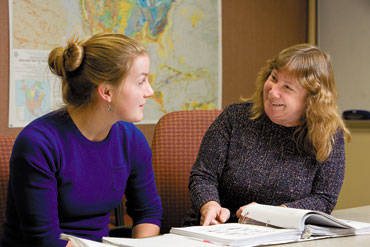Prof guides future generations of female scientists
When Jean Bahr believes in something, she doesn’t hesitate to act.
The solar-paneled roof on her home — the first even in eco-conscious Madison — stands in testament to her dedication to understanding and preserving the environment.

Geology professor Jean Bahr (right) talks with first-year geology master’s student Meghan Dickoff before class starts. Bahr takes an active role in advising aspiring women scientists through several mentoring programs.
Photo: Bryce Richter
And her years of supporting women in science speak to her commitment to increasing the ranks of female scientists.
“Even though there are lots of women students in the geosciences, there’s a huge leaky pipeline as you move up, particularly in the faculty ranks,” says Bahr, a geology professor.
She knows the value of mentoring for a fledgling scientist, especially a woman working in a field largely populated by men.
Bahr was one of the first female geology majors at newly coed Yale. As she progressed through college, she credits a handful of mentors — mostly male — who encouraged her along the way, helping her find summer jobs and research experience.
One structural geology professor was delighted to work with Bahr and the few other female students in the class, as a way to repay a former female geology teacher of his. “I remember him saying that he felt this debt to a woman scientist and he was really happy to be training women scientists finally,” Bahr recalls.
Now a recognized leader in hydrogeology, a full professor and geology department chair, Bahr began her academic days knowing only that she wanted to study science, preferably the environment.
But “environmental science” degree programs — nearly ubiquitous now — were virtually unheard of in the early 1970s. Instead she cast a wide net across many scientific disciplines and discovered geology.
“The study of the Earth is the study of the environment, so it was a pretty natural fit for me,” Bahr says. Plus, she adds with a smile, “I’d taken some geology courses. They had field trips, and you could go camping.”
Bahr’s research centers around hydrogeology — water and the Earth — but she lets the broader significance of the research drive the specific questions she strives to answer.
“My research path has not been a narrowly focused straight line,” she says. “I’ve taken advantage of opportunities to work on different kinds of problems… It’s been important to me to work on things that somebody cares about, besides just a narrow academic community.”
Her approach has taken her from investigating groundwater in the third world to studying environmental contamination at first world Superfund sites, and even onto a deep-sea drilling rig.
“I’ve never planned my life out that carefully,” Bahr says. “I’ve seized opportunities that came along.”
As she developed the many facets of her academic research career, she sought out the smattering of female faculty in the physical sciences and engineering for camaraderie and support, especially when navigating the tenure process.
Now she’s active on the other side of the equation, advising aspiring women scientists through several mentoring programs at UW–Madison, on the Web and through professional societies, as well as with students in her lab and department.
And she is enjoying the changes she sees with each new generation of students and young faculty, citing a recent women’s networking event at the annual Geological Society of America meeting.
“It’s fun if you’re in a field where women are not in the majority to suddenly find yourself in a room full of several hundred women who are all part of your profession.”



